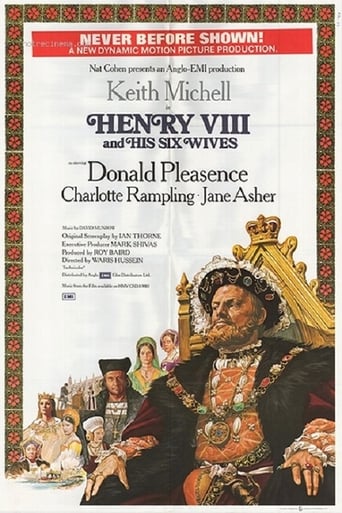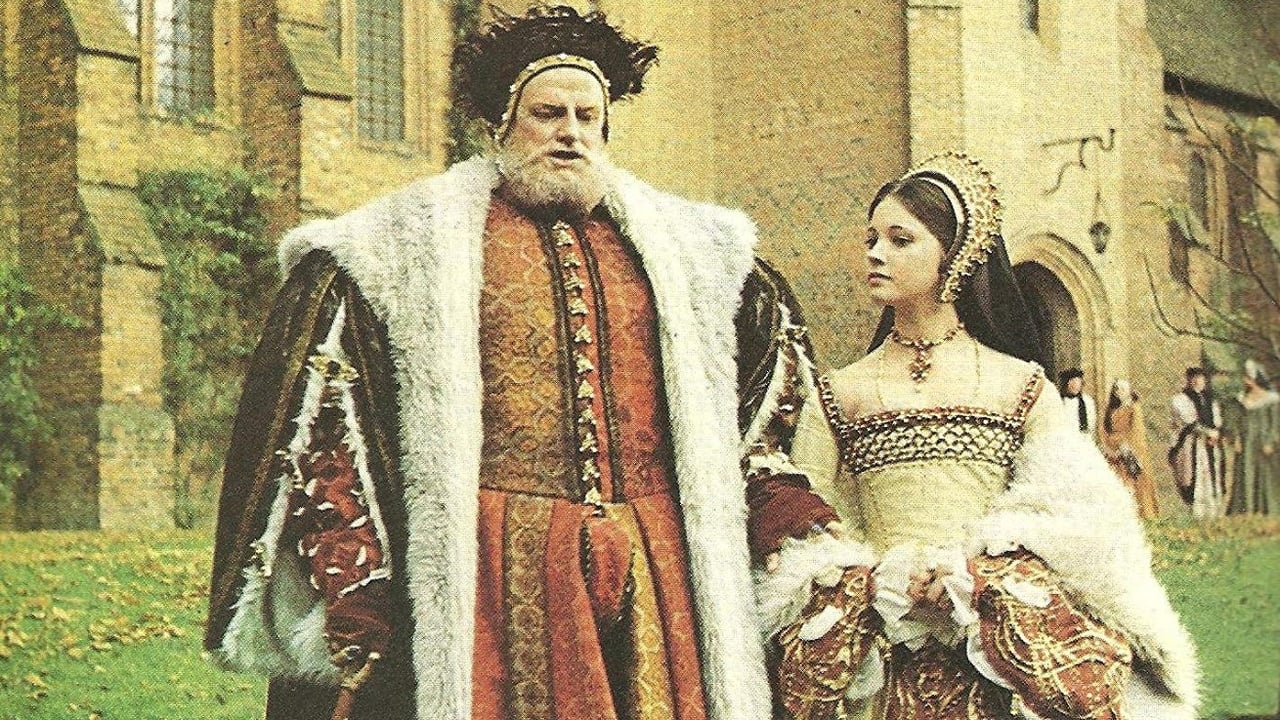TheLittleSongbird
Although I am no historian, I do take an interest in the subject and I loved learning about the Tudors even in primary school. Henry VIII and his Six Wives is for me one of the better films and such detailing of Henry VIII and his life and six wives. The story is compelling and well paced and the dialogue is intelligent and moving. For me, my only complaint really is the length, the events and details are compressed for just over two hours. For so many details and events, I couldn't help thinking it was too short and some of the events could have been expanded upon and some of the latter half less over-balanced perhaps. That fault aside, the film is splendidly directed, is reasonably true to history and maintains a strong emotional impact. David Munrow's music score is beautiful and evocative too. But two things especially stood out. One was the period detail and production values, the costumes and scenery are nothing short of splendid and the photography captures that beautifully. The other is the acting, which is wonderful from the entire cast. Keith Michell gives a textbook example of how to play Henry VIII, he doesn't play the famous king as a tyrant but his portrayal is a moving and somewhat more sympathetic one. Of his wives a stunning Charlotte Rampling and suitably vulnerable Lynne Frederick come off best, while Bernard Hepton is a fine Cramner and Donald Pleasance is a wonderfully devious Cromwell. In conclusion, a very good film. 8/10 Bethany Cox
Leofwine_draca
This is benchmark-quality drama, a two-hour film retelling of the lives (and deaths) of Henry VII's wives that uses much the same cast and crew as a previous six-hour BBC miniseries.As a film, it's pretty much unbeatable and sets a standard of high quality that few others can match. Sets, costumes and backdrop are all superb, but of course the real strengths lie in the script and the calibre of acting. Keith Michell stars in a role he was born to play, never less than authentic whether he's playing Henry as an athletic young man or as an obese ancient. He also manages to make the tyrant deeply human, which is another string to his bow.With the full story of the six wives crammed into a two-hour time slot, the pacing is fast and the script full of drama. Some of the wives fare better than others, but highlights include Charlotte Rampling's witchy Anne Boleyn and Lynne Frederick's captivating innocent, Catherine Howard. Filling the supporting cast with familiar, entertaining figures like Michael Gough, Donald Pleasence and Brian Blessed is another plus.Most of all, though, I found this retelling succeeded far better in bringing to life the era than others - check out the terrible THE OTHER BOLEYN GIRL for a good comparison. We learn much about politics, entertainment and religion of the era, but it's never told in a dry or heavy way. Unbeatable? Yes, I think this is.
IridescentTranquility
I first saw this film, aged about ten, as a result of my great interest in the famous King Henry and I think possibly also because I was in the middle of writing a short play about him. It's been a while since I saw this, but - looking back - I think I was perhaps a bit young to view it back then. There's nothing explicitly gory or violent but some scenes - on reflection - are perhaps a bit much for children of that age.Nevertheless, it does tell the story of Henry and his wives, even if you get the sense that some things (the real Catherine of Aragon, for instance, was pregnant about six times, but you'd never know it from this - one might get the impression that she only had two children before Henry tired of her) are brushed over a bit. In keeping with the real time span, a lot of time is concentrated on Catherine and her successor Anne Boleyn although I seem to remember that nothing much is made of, for instance, Henry's need to marry the pregnant Anne before she bore the future Elizabeth I.Although the story is told in flashback and some major points in history (eg. the dissolution of the monasteries) are dealt with through scene montages, you do get a flavour of Henry VIII's character and life - notice how the plainly-dressed Jane Seymour becomes more decorated as she gains the king's notice - and even an idea of communication in Tudor times (he decided to marry Anne of Cleves because he saw a miniature of her). It occurs to me that the focus on Henry may be a disadvantage - we don't see Anne of Cleves adapt to life as the King's sister, we don't see the Holy Roman Emperor enraged when his aunt Catherine of Aragon is being divorced, we don't see much of the infant Elizabeth I at all.One opinion this film formed for me was the idea that Katherine Howard was very much a victim of fate. I have read that the real woman was sexually precocious (although this film merely gives the impression that she was a bit flirty) because of her grandmother's lack of moral guidance, but this interpretation made me think that the Duke of Norfolk, head of the Howards, suddenly jumped on an opportunity to get into Henry's good books by pushing a young family member under the King's nose (apparently unaware of his teenage niece's past - she must certainly have been the least suitable member of his family to have been promoted in this way) without bothering to properly consider his actions.Little is made of Catherine Parr - after Henry's dispatch of his fifth queen - and one gets the impression that he settled into a happy family life, failing to mention that he did in fact have the unfortunate woman investigated due to her religious convictions. However, my A-Level history lessons led me to believe that mediaeval kings were quite at liberty to be ruthless despots, and Keith Michell certainly gives us an idea that Henry was that way inclined.
sa013
**WARNING SPOILERS - for those of you unaquainted with English history**This is an excellent period drama with a good cast including Donald Pleasence (Thomas Cromwell), Charlotte Rampling (Anne Boleyn), Jane Asher (Jane Seymour), Lynne Frederick (Catherine Howard), Michael Gough (the Duke of Norfolk) and Brian Blessed (the Duke of Suffolk) and an excellent portrayal of King Henry VIII by Keith Michell.Michell is very good as Henry VIII, portraying the King from his youth, married to the Spanish Katherine of Aragon, to his old age with the wife who would out-live him, Catherine Parr. Over this period of time Michell undergoes a serious transformation from an energetic young king to an immense gout-ridden old man. However, Michell's transformation is not merely cosmetic and he manages to change his voice, posture, bearing and the whole character of the king.The story charts the six marriages of King Henry VIII. First his marriage to Katherine of Aragon (Frances Cuka), mother of the future Queen Mary "the Bloody", for whom he had genuine affection but whose inability to conceive a son resulted in Henry's divorcing her and the King's historic break with the Catholic Church and their "Bishop of Rome".A slightly weightier Henry indulges in a passionate love affair with Anne Boleyn (Rampling), mother of the future Elizabeth I "the Virgin Queen", which ended with the King's paranoia placing her head beneath the executioner's axe. Henry then moves on to Jane Seymour (Asher), the only one of his wives that Henry seems to have genuinely and enduringly loved and may well have stayed with had she not died giving birth to Henry's only son, the future Edward VI.After Jane's death the King is persuaded by Thomas Cromwell (Pleasence) to marry again and chooses the German Anne of Cleves (Jenny Bos) on the basis of a rather too flattering picture - this portion of the film is surprisingly funny, as the much older and fatter Henry is visibly distressed by Anne's grotesque appearance.Perhaps one of the most touching parts of the film is the marriage between Henry and Catherine Howard, like Anne Boleyn, a relative of the Duke of Norfolk, who would follow her to the block, played exceptionally well by the late Lynne Frederick. Frederick is beautiful and so much younger than the extremely overweight Henry that it makes her obviously genuine affection for the old King all the more touching. Unlike Anne Boleyn, the King was forced, very much against his will, to have Catherine be-headed and the scene where the King bursts into tears in front of the entire Privy Council is very moving.The film closes with Henry on his death-bed, surrounded by many of the same advisers who had made his life so difficult (I rest easy in the knowledge that most of them were later executed by the King's formidable daughter, Elizabeth) and his last wife, Catherine Parr (Barbara Leigh-Hunt). This is a film of epic proportions and, although not as good as the B.B.C. series (also starring Michell), it is excellent and the costumes and setting are divine.The good thing about this film is that it shows Henry as more caring than he is usually portrayed and reveals how he was the victim of many visissitudes at the hands of his most loyal lieutenants, especially Norfolk, Cromwell, Cranmer (Bernard Hepton), Gardiner (Garfield Morgan) and Wolsey (John Bryans). Watch out for the brilliant scene where Donald Pleasence's Cromwell is de-frocked by the entire Privy Council - it's movie magic.7/10


 AD
AD



